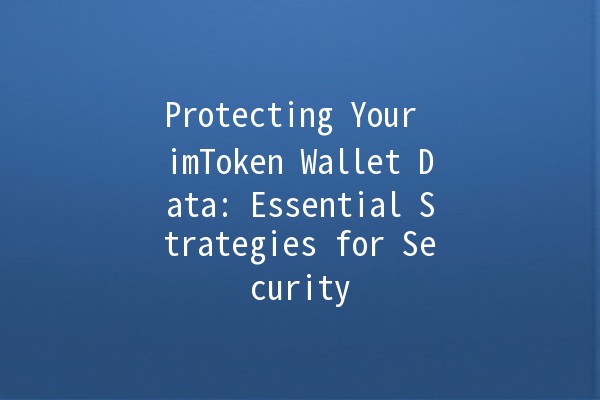In the everevolving world of cryptocurrencies, ensuring the safety of your digital assets has never been more critical. One of the leading wallets today, imToken, offers a range of features designed to keep your assets secure. However, users must also adopt practical strategies to protect their wallet data. Below, we delve into essential tips and techniques to bolster your imToken wallet security.
Before we explore specific techniques, it's crucial to understand why safeguarding your wallet data is essential. With the increasing number of cyberattacks targeting cryptocurrency users, protecting sensitive information such as private keys and recovery phrases is paramount. Data breaches can lead to irreversible financial loss and exposure of personal information.

By implementing effective protective strategies, you can significantly reduce these risks.
Explanation: TwoFactor Authentication adds an extra layer of security by requiring not only a password but also a second verification method.
Application Example: For imToken, always enable 2FA on your account. Using apps like Google Authenticator or Authy can help. These apps generate timesensitive codes that only you can access, making it significantly harder for unauthorized users to gain access.
Explanation: Your private key is the most crucial aspect of your cryptocurrency wallet. Losing it or having it fall into the wrong hands can lead to severe consequences.
Application Example: Utilize hardware wallets for storing your private keys. Devices like the Ledger Nano S or Trezor are excellent choices. If you prefer digital storage, encrypt the key using strong passwords and store it offline in a secure, encrypted file.
Explanation: Keeping your applications up to date is essential for safeguarding against vulnerabilities.
Application Example: Check for updates to the imToken wallet regularly and enable notifications for new versions. Updates often include security patches that protect you from newly discovered threats.
Explanation: Phishing scams target your information by tricking you into visiting bogus sites.
Application Example: Always doublecheck URLs before entering sensitive information into websites and avoid clicking links in unsolicited emails. Bookmark the official imToken website and access it directly to ensure you are navigating to the right place.
Explanation: A strong password is your first line of defense against unauthorized access.
Application Example: Use a mix of upper and lower case letters, numbers, and special characters to create a strong password. Additionally, utilize a password manager to help generate and store unique passwords for different accounts safely.
Explanation: Regular backups can save you in case your device is lost, stolen, or damaged.
Application Example: Export and securely store your wallet data in multiple formats and locations, such as encrypted USB drives or cloud storage, with strong security measures in place. Make sure to include your recovery phrase in your backup, as it will be essential for wallet recovery.
In addition to employing protective measures, understanding the warning signs of potential threats can further enhance your security posture. Be vigilant for the following indicators:
Unusual Activity: Monitor your wallet transaction history for any activities you do not recognize.
Alerts from Security Software: If your antivirus or security software detects a potential threat, take it seriously and investigate further.
While preventative measures are crucial, it's also important to have a plan in case your security is compromised. If you suspect your wallet has been breached:
As the cryptocurrency landscape evolves, so do the threats against it. Continuous education about the latest security trends and practices can help you stay one step ahead. Follow reputable cybersecurity blogs, forums, and the imToken community for updates and advice on maintaining wallet security.
By implementing these protective strategies and staying informed about potential threats, you can significantly enhance the security of your imToken wallet and safeguard your digital assets. Remember, effective security requires a proactive approach and continuous vigilance.
Q1: What is the best way to secure my imToken wallet?
To secure your imToken wallet, enable twofactor authentication, use strong passwords, regularly back up your data, and be cautious of phishing attempts. Employing hardware wallets for sensitive keys is also highly recommended.
Q2: Can I recover my wallet if I lose access?
If you have securely backed up your recovery phrase and private keys, you can recover your wallet on a new device. Always ensure these backups are stored securely.
Q3: What constitutes a strong password?
A strong password typically contains at least 12 characters, including upper and lower case letters, numbers, and special symbols. Avoid using easily guessable information, like birthdays or common words.
Q4: How do I recognize a phishing website?
Phishing websites often mimic legitimate sites but may have subtle differences in the URL. Always verify the site's authenticity and look for security indicators, such as HTTPS in the URL and a site lock icon.
Q5: Is it safe to use public WiFi to access my wallet?
Using public WiFi can expose you to significant risks. If necessary, use a VPN to encrypt your connection, minimizing the chance of interception by unauthorized individuals.
Q6: What should I do if I suspect my wallet has been compromised?
If you believe your wallet has been hacked, immediately transfer your funds to a new wallet, change all related passwords, and consider consulting cybersecurity experts for further assistance.
By actively engaging in securing your wallet and being informed, you can protect your assets against the increasingly sophisticated tactics of cybercriminals.